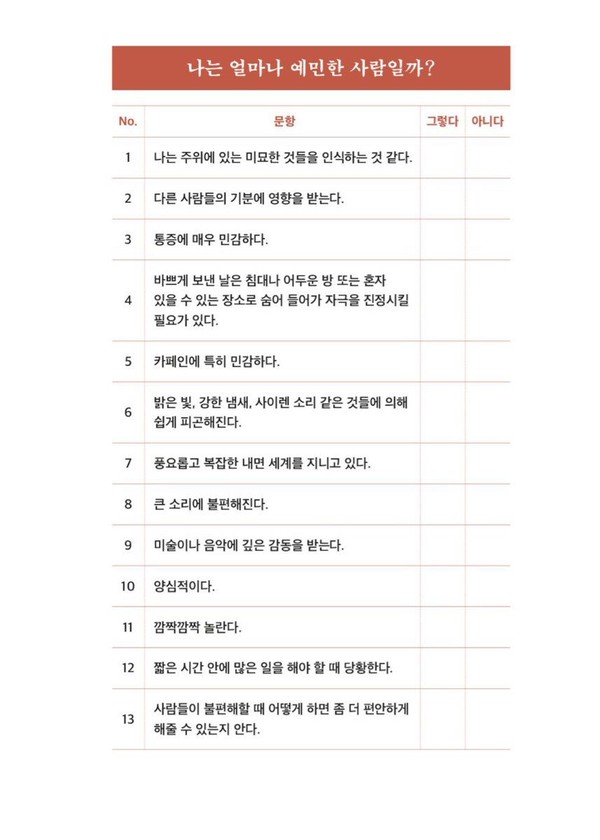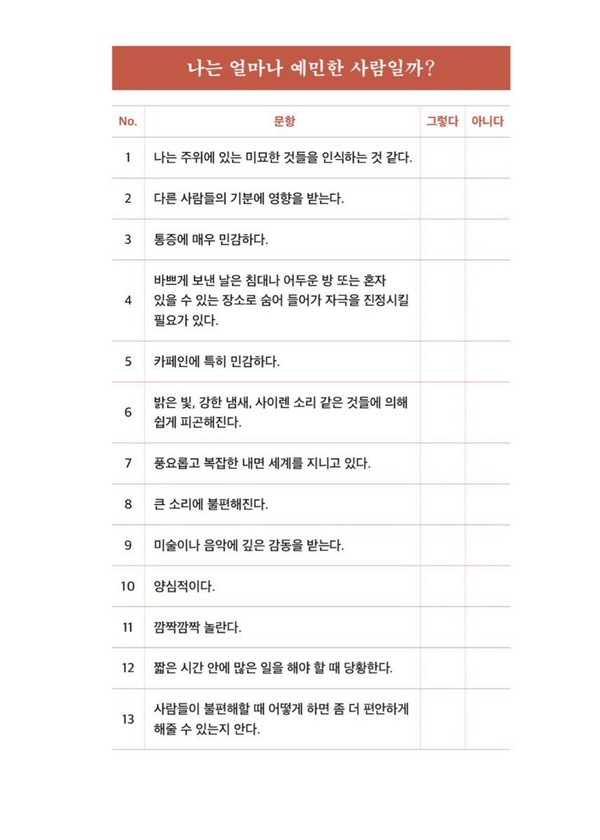Have you ever wondered, “Why does that person act that way?” In December 2024, the YouTube channel “하말넘많” uploaded a video titled “Why Is That Person Like That?” which discussed highly sensitive people, HSPs. This video resonated with many viewers. In the comments section, people shared reactions such as, “Wait... doesn’t everyone feel this way?” and “This is totally me!” Some viewers recognized traits in themselves, while others shared their personal stories about sensitivity and found empathy through the shared experience.
Afterwards, HSP tests and “sensitive person tests” spread across social media and various online communities. Below is a self-test from the book “나는 왜 남들보다 쉽게 지칠까” (by Choi Jae-hoon). Although it is just a self-assessment, I encourage you to try it. Of course, for a professional diagnosis, consulting an expert is the best course of action.


@ “나는 왜 남들보다 쉽게 지칠까” (by Choi Jae-hoon)
How many of these traits apply to you? If you identify with 13 or more, there’s a high likelihood that you have a highly sensitive temperament. If that’s the case, I hope the following text will help you gain a deeper understanding of yourself. Even if not, this article will help you better understand others.
So, what exactly is HSP? HSP stands for Highly Sensitive Person, and in Korea, it is often referred to as a “super-sensitive person.” It refers to people who are sensitive to sensory input and experience intense emotions. This concept was introduced in 2006 by American psychologist Elaine Aron. Dr. Aron characterized HSPs as people with a sensitive nervous system who can perceive subtle differences in external stimuli and are easily overwhelmed by stimulating environments. She estimates that about 16% of the world’s population are HSPs.
Then, what characteristics do HSPs have? According to Elaine Aron’s DOES theory, HSPs possess four main features. The first is Depth of processing. HSPs tend not to simply accept information at face value, but analyze and think deeply about it. Before applying information to new environments or situations, they try to fully consider and evaluate its meaning. Therefore, they are skilled at finding deeper meanings and connections beyond what is immediately apparent. Because they consider many possibilities before making decisions, they tend to make careful and reliable choices. While most people might consider options A, B, and C, HSPs will also take into account options D and E. This can be a source of creative ideas. However, processing so much information deeply can make decision-making time-consuming, mentally exhausting, and sometimes lead to decision avoidance.
The second feature is O, Overstimulation. HSPs react more sensitively to external stimuli such as light, sound, smell, and touch, and can easily become overwhelmed. They often feel stressed in noisy, bright, or crowded environments. When too many things happen at once or when emotional situations overlap, their energy is quickly depleted. As a result, they tend to prefer quiet and calm environments.
The third feature is E, Emotional reactivity and empathy. They react emotionally in a deep and intense way, and tend to feel others’ emotions as if they were their own. They are so highly empathetic that they can easily pick up on others’ feelings and be affected by them. Also they are often deeply moved by characters’ emotions in art, music, or literature. They may find it difficult to watch dramas or movies with violent or cruel scenes because they empathize with the characters’ pain. Furthermore they may feel embarrassed or uncomfortable when someone is humiliated on TV as if it were happening to themselves. They also can become emotionally drained by negative emotions from others.
Lastly, the last feature is Sensitivity to subtle stimuli. HSPs have a keen sense of observation and can detect even small changes in their surroundings. They easily notice subtle facial expressions or tremors in someone’s voice. They are sensitive to changes in atmosphere and quickly pick up on conflicts or tension between people. In the aforementioned 하말넘많 video, a comment with 23,000 likes is, “On You-Quiz, when the guest only looks at Yoo Jae-suk and never at Jo Se-ho, it bothers me.” “You-Quiz” is a show where Yoo Jae-suk and Jo Se-ho interview guest. The commenter quickly noticed the imbalance of the guest only looking at Yoo Jae-suk and felt concerned for Jo Se-ho’s feelings. This comment demonstrates both the E and S characteristics.
How do you feel when someone says ‘You’re so sensitive’? Very few people would take this as a compliment. The negative perception of sensitivity often stems from self-defense (“I’m not that sensitive”) and can lead HSPs to view themselves negatively. So how should we perceive HSPs?
We need to reconsider how we perceive “sensitivity.” Sensitivity is not a disorder. Although it is sometimes confused with psychological conditions, HSP is simply one of the many temperaments humans can possess. The negative view of sensitivity is just a social stereotype, not a problem in itself. In fact, it should be seen as an important ability to perceive the world deeply and attentively. Labeling sensitivity as “excessive emotion or sensation” only prevents HSPs from viewing themselves in a positive light. We live in a society with people of diverse personalities and temperaments, and sensitivity should be acknowledged as just one of many valid temperaments.
So what should HSPs do? They should strive to understand and accept their temperament, and find ways to harness it positively. Instead of thinking, “I’m just tired and exhausted because I’m sensitive,” it’s crucial to focus on the strengths that sensitivity brings. Deep thinking, keen senses, and strong empathy can all be valuable assets in society, making it worthwhile to explore how to utilize them effectively.
For HSPs, in order to utilize their temperament positively, it’s essential to learn how to manage their environment and regulate their emotions.
The first method is to create a controllable environment. HSPs are easily stressed in unpredictable or uncontrollable situations. Maintaining a few close relationships or living in a physically safe environment can provide stability. Therefore, it’s advisable to place yourself in environments where you have more control than not.
However, achieving this can be challenging in practice. If creating a controllable environment is hard, another option is to focus on regulating your emotions. One technique is to observe situations from a third-person perspective. Practice stepping back and looking at your thoughts and emotions objectively, rather than getting overwhelmed by them. Since HSPs can easily become absorbed in their own thoughts and emotions, this can be an effective strategy for managing their temperament.
It’s also helpful to accept that others may not be as sensitive as you are. Not everyone thinks or feels at the same intensity as an HSP. Recognizing that your temperament differs from others’ is the first step toward understanding yourself and others. Rather than overthinking or reacting to others’ dull or indifferent responses, try to adopt the mindset “their standards are different from mine” and let go of those thoughts.
Lastly, engage in hobbies that give you a sense of stability. Spend time alone drawing, listening to music, reading, or doing other activities that make you feel comfortable. Hobbies are not merely leisure activities; they are important ways to calm your emotions and relieve stress. I recommend finding a hobby that brings you both comfort and joy.

Learning about HSPs is not just about understanding “sensitive people,” but about fostering an attitude of respect and acceptance toward diverse temperaments. We are all born with various traits and experience the world in our own ways. Some people are highly sensitive, while others may be less so. The key is to accept and respect all temperaments as they are.
By gaining a deeper understanding of HSPs and other temperaments, we can positively impact not only our own lives but also society at large. When we respect and accept each other’s differences, we can create a more inclusive and compassionate society.
I hope this article helps you to better understand yourself and others. Whether you are sensitive or not, every temperament deserves respect. Embrace your own traits with a positive mindset, and make an effort to understand the differences in those around you.

